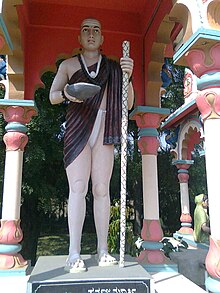Sarvajna
Appearance
(Redirected from Sarvajña)
This article's factual accuracy is disputed. (September 2017) |
Sarvajña | |
|---|---|
 Statue At Kudalasangama | |
| Born | Early 16th century Abalur, Hirekerur Taluk, Haveri District |
| Died | Masur, Rattihalli Taluk, Haveri District |
| Occupation | Poet, Pragmatist, Philosopher, Monk |
Sarvajña was a Kannada poet, pragmatist and philosopher of the 16th century. The word "Sarvajna" in Sanskrit literally means "the all knowing". His father was Kumbara Malla and his mother was Mallaladevi. His birth anniversary is celebrated on February 20 every year. He belongs to the caste of Kumbara. He is famous for his pithy three-lined poems called tripadi (written in the native three-line verse metre, "with three padas, a form of Vachana"). He is also referred as Sarvagna in modern translation.[1]
Early life
[edit]The period of Sarvajña's life[2] has not been determined accurately, and very little is known about his personal life.
See also
[edit]References
[edit]- Sources
- Medieval Indian Literature: An Anthology By K. Ayyappapanicker, Sahitya Akademi
- Gandham Appa Rao, Vemana and Sarvajña, Progressive Literature (1982).
- Anthology of Sarvajna's sayings, Kannada Sahitya Parishat (1978).
- K. B Prabhu Prasad, Sarvajna, Sahitya Akademi (1987), reprint 1994 ISBN 81-7201-404-X.
- Notes
- ^ "ಕವಿ ಸರ್ವಜ್ಞ (Poet Sarvajna)". kanaja.in , Kanaja. Retrieved 28 September 2017.
- ^ "Sarvagna and his vachanna". web.missouri. Retrieved 22 October 2010.
External links
[edit]Wikimedia Commons has media related to Sarvajna.
Wikiquote has quotations related to Sarvajna.
- know more about sarvajna and his poems
- Sarvajna's three-liners (Kannada page)
- Sarvajna's three-liners (with English translations)
- Picture of Sarvjna's Manuscript
- Sarvajna's vachana in Kannada
- Sarvagna's Tripadi with translation, transliteration and explanation
- 200+ Collection of Sarvajna Vachanagalu(Android App)
- An app with Sarvagna Tripadis curated for application in today's world
